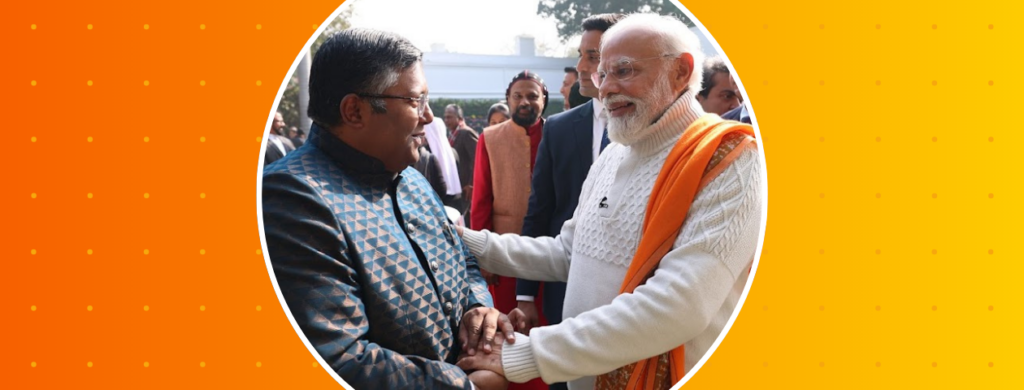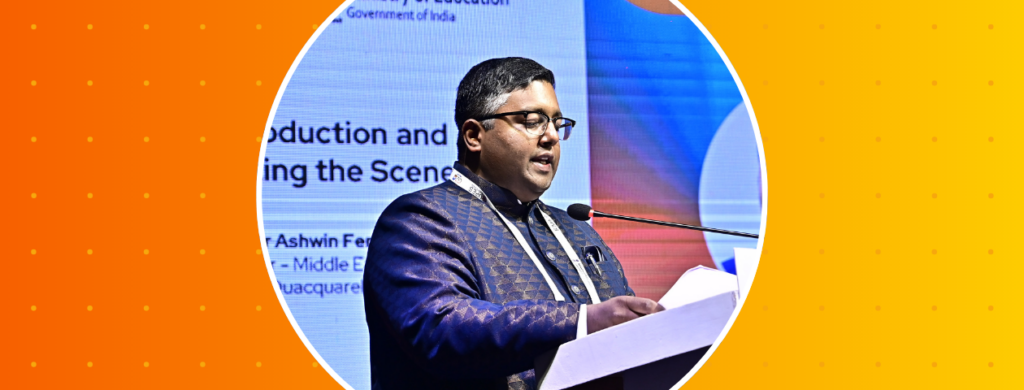
With over 1,000 universities and 42,000 colleges, the Indian higher education system has witnessed tremendous growth since the nation’s independence and is now one of the largest in the world. Supported by a forward-looking and ambitious government policy, the country is uniquely positioned to educate the young people at the frontline of solving world challenges.
The dynamic connection between India and the UK – or the ‘living bridge’ – consists of historical ties, shared values and ongoing collaboration that’s evolved over centuries. Yet with rapid technological advancements, shifting social and political landscapes and changing economic conditions, new thinking is required in powering the global knowledge economy.
At the launch of the QS report ‘India’s Global Vision: Building Universities for a Knowledge Economy’ at the House of Lords, Professor C Raj Kumar, Vice-Chancellor of O. P. Jindal Global University, chaired a roundtable discussion with senior leaders in Indian and UK higher education on how to build innovative partnerships between the two nations.
Those higher education leaders state that it’s essential to build partnerships that provide high-quality education that is adaptable and responsive to the changing needs of students and society.
A student-centric mindset
The Indian higher education sector has over 35 million students and a population of almost one billion people under the age of 35. With digital transformation at its peak, students can do in-depth research into their studies and choose a university that will give them the experience and skills they’re looking for to be successful in their careers.
64% of students in India say that a high graduate employment rate is most important when choosing a university for career outcomes according to QS’ International Student Survey 2023.
According to Professor C Raj Kumar, there is a “tectonic shift in the mindset of both students and parents” when it comes to the focus on employability, careers support and industry skills provided by universities. “Parents and students come to my office and ask me what placements and work opportunities are available.”
The opportunity, he said, is in creating collaborative partnerships that enable students to “learn resilience” in facing today’s rapidly changing world and provide the skills to go “beyond being work-ready but enabling students to be life-ready in facing today’s global challenges and with growing industry demand to upskill” throughout their careers.
Democratising access to international education
In Western higher education, tuition fees and the cost of living are increasing exponentially, posing a significant challenge to students from India to be able to access quality international study.
In the QS International Student Survey 2023, 59% of prospective students in India say that the most important factor when choosing a course is the affordability of tuition fees. 48% say the most important factor when choosing a university is the availability of scholarships.
“Partnerships between the UK and India with the aim of advancing knowledge economy must consider how we can democratise internationalisation,” said Professor Kumar.
For Professor Shitij Kapur, Vice-Chancellor and President of King’s College London, the issue of being able to afford an international experience is “not only a challenge in India but every bit a challenge for students in the UK too.
“The percentage of UK students studying abroad has dropped substantially since Brexit and the collective challenge we face is that the majority of students are not able to explore the world in their formative years and have the ability to influence and partake in cross-cultural experiences.”
Advancing technology for social good
The rapid pace of technological advancement has brought about significant changes and India’s provision for tech education is up there with the leading markets.
Five Indian institutions sit in the top 100 universities for engineering and technology according to the QS World University Rankings by Subject 2023 and the CEOs of some of the largest tech companies including Adobe Inc, IBM and Microsoft have received an Indian education.
While commercial tools like AI chatbots and smart technology make their way into everyday life, members of the roundtable were unanimous that an important responsibility for universities will be the application of these new technologies for social good.
“Understandably, commerce will do what commerce does,” Professor Kapur added, “but where else in society [other than universities] are there people with the intellectual calibre to worry about the ethical impact? I think there are great possibilities here and to create a measure of the social good we could do, together across both nations.”
Building a two-way corridor
Using data from a sample of over 16,000 offer holders of QS’ partner institutions for the January 2024 intake, and web traffic data from our student-facing website, topuniversities.com, there has been a 46% uplift in the number of Indian offer-holders, rising from 2,523 at this point in the cycle for 2023 to 3,688 for January 2024.
Though a living bridge fit for the future must flow both ways and look beyond the number of Indian students who can afford to enrol at UK universities.
Dr Ashwin Fernandes, QS Executive Director for the Africa, Middle East and South Asia region, said: “It’s also about building India and the UK contributing to the global knowledge economy. There are opportunities to uplift the higher education system in India by reaching out to schools and providing some skills and training to start them on their journey of lifelong learning.
“Indian scientists who worked on the Chandrayaan, India’s lunar-exploration mission, and Samudrayaan, India’s crewed expedition to a depth of 6,000 m in the central Indian Ocean, have come from second and third-tier regional colleges in India. The opportunities to work with those cities and villages to build impact early on and upskill the nation is a plenty.”
Other recommendations included the creation of India immersion programmes and India-focused degrees at UK universities, extending invitations to Indian professors to work or become professors of practise at UK universities, and the imperative task of engaging industry partners in developing work-ready skills and providing professional opportunities in India.
Professor C Raj Kumar said: “The future is going to be substantive collaborations and partnerships with Indian institutions where real-life experiences can be provided for both students and faculty.”
Speaking at the event, QS CEO Jessica Turner said: “Much of the value of gathering together is the partnerships and collaborations that are sparked and enhanced as a result – between universities and industry; between universities within India and universities globally; and role that collaboration – both through partnership and interdisciplinary research – can play to help solve the complex challenges we are facing.”



